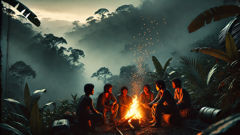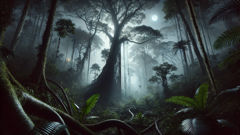Introduction
Long before the sharp scent of diesel and the buzz of cell phones, before the web of highways cut through Colombia’s heart, there thrived a landscape untamed and wild. Here, in the mist-shrouded forests of the Antioquia region, the jungle stretched endlessly—its canopy a living cathedral, its undergrowth a maze of shadow and sound. The people who eked out a life at its trembling edge knew these woods intimately. They knew which berries would poison a man and which would heal him. They read the changing winds as easily as a priest reads a prayer. Yet for all their knowledge, the jungle remained a place of fear—a living thing that watched, waited, and, when it wished, devoured. In this green labyrinth, stories grew as thick as lianas, their roots tangled with truth and terror. Among the oldest was the tale of the Patasola. She was a whisper at dusk, a shiver when the wind pressed through the trees. Men, especially, learned to fear her: a vision of irresistible beauty who called out from the shadows, leading hunters, woodcutters, and wanderers deep into the wilderness. Only too late did her victims glimpse her monstrous form—a woman with a single, grotesque leg—and realize they’d stepped beyond the world of men into the domain of something ancient and vengeful. Tonight, the jungle breathes heavy with memory. The river runs black under a veiled moon. And in a nameless village at the forest’s edge, a handful of men gather by the dying light, spinning tales both as warning and confession. For in Colombia’s darkest jungles, no one walks alone—not truly. The Patasola is always listening.
Campfire Whispers: The Men of Santa Marta Vieja
Santa Marta Vieja was more clearing than village—a clutch of clay-tiled roofs and rough-hewn walls pressed up against the living wall of jungle. The men here were made hard by the forest, their hands scarred from machete work, their backs bent by years of harvesting cacao, timber, or whatever else the land would surrender. When dusk fell, work slowed and the ancient fear awoke anew. On this particular evening, a bonfire smoldered at the village’s edge. Orange light flickered across tired faces as the men exchanged stories and aguardiente, each sip burning away the day’s cold.

The oldest among them, Don Mateo, sat cross-legged near the flames. His face was a map of wrinkles, and his eyes still carried the wildness of his youth. "You boys laugh now," he rasped, as embers spun into the night. "But every one of you has heard her cry—out there, beyond where the torchlight dies."
A hush spread. Even the forest seemed to listen. "You mean the Patasola," whispered Diego, the youngest. He tried to sound brave, but his voice quavered. "They say she’s just a story to keep us from wandering."
Don Mateo shook his head. "She’s real, mijo. I saw her once."
Laughter rippled, but it was thin, nervous. Still, all leaned closer as Don Mateo’s tale unfolded. He spoke of his uncle, a hunter, who vanished after chasing a beautiful woman deep into the ceiba groves. Only a single, bloody footprint had marked his return—the print of a woman’s foot, grotesquely large, fused at the knee.
A tremor ran through the group. The jungle’s edge loomed close; its darkness seemed to thicken, as if the story itself fed the night. It was then that a stranger arrived—a newcomer to Santa Marta Vieja, gaunt and sunburned, carrying a battered pack and a city man’s confidence. His name was Esteban Sánchez. He’d come, he said, for land. But as he listened to the old man’s story, something else kindled in his eyes: curiosity, perhaps, or pride. "There are no monsters in these woods," Esteban declared. "Only men, and the beasts we hunt."
Diego laughed, relieved, but Don Mateo’s gaze never wavered. "You’d do well to remember, señor, that pride is what the jungle loves most to punish."
That night, Esteban lay awake in his borrowed hammock. Outside, the forest rustled—alive with cicadas and frogs and the slow, sucking hush of distant rain. Somewhere in the blackness, a woman’s laughter echoed. It was soft, almost sweet. And it didn’t belong to anyone from Santa Marta Vieja.
Into the Heart of Darkness: Esteban’s Quest
The morning after Don Mateo’s story, a thick fog hung low over the village. The world seemed reduced to shades of green and gray, and the only sounds were birdcalls and the distant cough of machetes splitting wood. Esteban set out early, his resolve sharpened by pride and a pinch of embarrassment. He’d come to Santa Marta Vieja to survey land and stake a claim for his family. But now, a different challenge gnawed at him: proving himself immune to superstition.

With Diego trailing behind—half friend, half shadow—Esteban pressed deeper into the forest than any local dared alone. The path soon vanished beneath tangles of vine and thorn. The trees grew immense, their roots snaking like veins over mossy boulders. Every so often, Diego would pause, peering into the gloom. “You hear that?” he’d whisper. Sometimes it was a monkey’s chatter or the clatter of toucans overhead. But once, a woman’s voice—high and melodious—drifted through the undergrowth. It called Esteban’s name. Diego went pale. “We should turn back,” he insisted. “It’s almost noon, and the Patasola—she hunts when the sun is highest or when night falls.”
Esteban scoffed, but as the sun climbed and sweat soaked his shirt, he felt a prickling at his nape. The forest seemed alive in ways he couldn’t name. Flowers pulsed with color too bright for daylight. Shadows moved against the breeze. Then, just as they reached a clearing by a sluggish river, Esteban glimpsed her. She stood among the orchids—long hair black as obsidian, eyes gleaming with impossible light. Her dress was white, pure and shimmering against the green. She smiled, and the whole world sharpened: the heat, the scent of earth, the hammering of Esteban’s heart.
Diego shrank back. “Don’t speak to her,” he hissed. But Esteban stepped forward, entranced. The woman beckoned. Her voice was music—each syllable a promise. “Come,” she whispered, “I know where the land is richest, where gold runs in the stream.”
As Esteban moved to follow, Diego caught his sleeve. “Her foot,” he gasped. “Look—her foot!” For a moment, Esteban saw only beauty. But then the spell broke, and he saw the truth: beneath her dress, there was no second leg. Only a single, monstrous limb—muscular and twisted, ending in a hoof black as pitch.
Esteban staggered back, horror battling fascination. The woman laughed—a sound like splintered bone—and leaped into the shadows, vanishing without a trace. Diego and Esteban ran, branches slashing at their skin, until they burst into the village, gasping and pale.
That night, the men of Santa Marta Vieja listened in awe as Diego spoke. Esteban said nothing; he could not sleep. In dreams, the Patasola called to him, her eyes filled with both hunger and sorrow.
The Pact and the Curse: Origins of the Patasola
Don Mateo, sensing Esteban’s silence, called a meeting beneath the ceiba tree the next evening. The men gathered again, their faces more somber than before. This time, Don Mateo shared a tale few in Santa Marta Vieja had ever heard in full: the legend of how the Patasola came to haunt their land.

He spoke of a time long ago, when the forest was young and men even younger. In those days, a woman named Rosalina lived at the jungle’s edge. She was famed for her beauty—hair dark as midnight, laughter that could charm birds from the trees. But Rosalina’s heart belonged to a wandering miner who promised her riches and escape from poverty. One night, the miner vanished with another woman, and Rosalina’s despair curdled into rage.
Blinded by heartbreak, she followed him into the jungle. She wandered for days, calling his name, cursing his betrayal. The forest, sensing her agony, answered back—not with comfort but with transformation. Lost in a fever dream, Rosalina made a pact: she called on ancient spirits, vowing to punish any man who strayed from his path or betrayed his vows.
At sunrise, villagers found her at the riverbank. Her beauty had curdled into terror: one leg fused and swollen, her teeth elongated, her eyes burning like lanterns. She screamed and vanished into the undergrowth. From that day, hunters and travelers whispered of a woman who appeared as an angel only to reveal herself as a monster, dragging her victims into oblivion.
Don Mateo’s voice faded. The men sat in uneasy silence. “She is sorrow and vengeance,” he said finally. “She is every pain the jungle remembers.”
Esteban listened, his own heart twisted with guilt and confusion. In his dreams, Rosalina’s face shifted between beauty and horror—a woman both betrayed and betrayer, victim and monster. The jungle pressed close; even the night air seemed to pulse with her presence.
The next day, Esteban wandered alone to the riverbank where he’d first seen her. He knelt and whispered into the silence, “What do you want?”
The forest replied with a hush, then a whisper—a voice both human and inhuman. “Remember,” it said. “All who betray the jungle’s heart must pay its price.”
Conclusion
The legend of the Patasola lingers like mist on the river, never truly fading from the minds of those who live at the jungle’s edge. For Esteban and Diego, the encounter left a mark deeper than any scar. Esteban no longer scoffed at stories; he moved through the forest with reverence, each step a silent apology. He saw now that the jungle was alive with memory—its creatures, its shadows, and its griefs. In Santa Marta Vieja, life continued, but the men no longer laughed so easily when the night pressed close. They honored old boundaries, left offerings at ancient trees, and remembered that in the wilderness, beauty could be a warning as well as a blessing. Some said they still heard Rosalina’s cries at dusk—a voice twisted by sorrow yet eerily lovely. The Patasola had become more than a monster; she was a lesson written in shadow and blood. She reminded all who heard her story that the wild places are never truly tamed and that every choice—every betrayal or kindness—echoes longer than a lifetime. The jungle keeps its secrets, but it never forgets.













